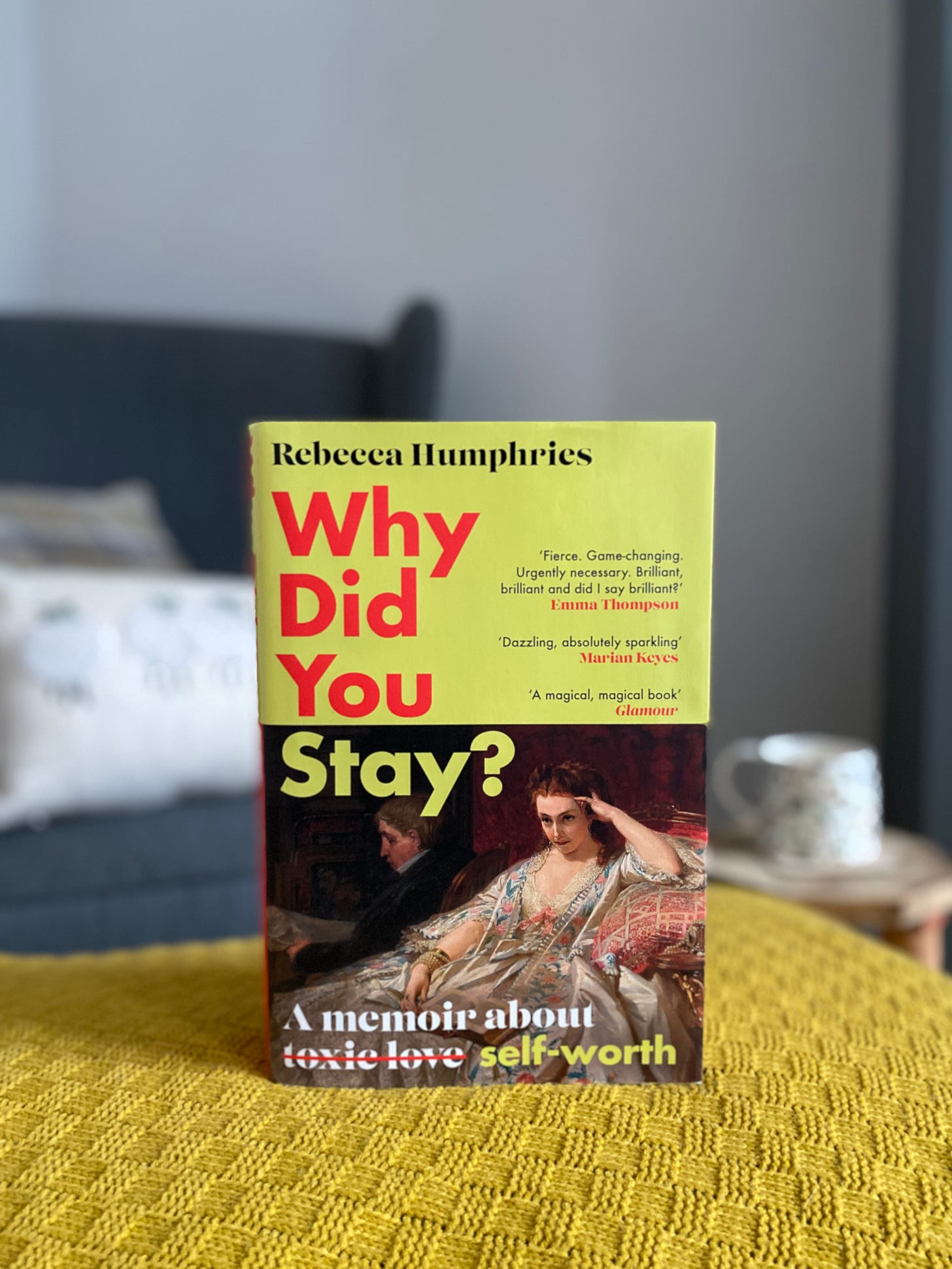Chapter 1: Why Did You Stay? by Rebecca Humphries
A memoir about the decay of a toxic relationship, filled with surprising warmth and humour.
When I sit down for coffee with fellow reader friends, it doesn’t take long for us to start trading our latest reads. Swapping tales of a favourite author’s latest or insights into the new ‘it’ book that’s all over our social feeds, quietly weighing up whether it’s worth bumping up the TBR pile.
But books aren’t really something I’ll bring up over coffee with other friends. This is probably why the few books I really can’t stop talking about with everyone really do wedge themselves in my mind. Why Did You Stay? is one of them.
I discussed this book with at least five friends in various catch-ups while I read it. In fact, it’s really the catalyst for bringing The Unfinished Bookshelf back to life: I was itching to write about it, shout about it and recommend it to even more people.
As a reader who gravitates towards the familiar, I was even more excited that I felt this strongly about a book I found in the ‘recommended’ section of a beautiful Edinburgh bookshop. (Rare Birds, if you’re wondering).
Rebecca Humphries’ love life became tabloid fodder in 2018 when the paparazzi snapped her boyfriend kissing his Strictly Come Dancing partner. She responded with a tweet that went viral. In it, Humphries described a five-year relationship in which she was called “mental” or “psycho” for questioning inappropriate or hurtful behaviour.
Amidst the flurry of supportive replies, Humphries saw a stranger’s question. It’s one that haunted her and, honestly, one we’ve probably all thought at some point: if he was so bad, why did you stay?
Humphries told The Guardian she wrote the book because she felt a sense of duty to others. “When I tweeted, I felt a similar sense of responsibility for the many who’ve had these experiences but don’t have a platform,” she said. “And when you voice your shame, it disappears. I want to encourage more people to do the same. So much of the book is about ending victimhood.”
One of the first things that struck me about Why Did You Stay? was choosing not to name the man. It was a brilliant stylistic move, meaning the book doesn’t really stray into gossip. Instead, it felt like any reader could overlay their own experiences. The importance of this in helping understand or recover from toxic relationships is reflected in Humphries’ recalling how an article about gaslighting on Love Island sowed doubts about the health of her own relationship.
Why Did You Stay? combines two timelines – one from when Humphries found out about the kiss and the other charting the first-love bloom and slow decay of the relationship. The question at the heart of this memoir is anything but simple to answer, but Humphries’ exploration of the gradual chipping away at her confidence and self-worth goes some way to showing how coercive control keeps people trapped.
Humphries discusses her own failings in the relationship, as well as questioning how the media girls consume from childhood adds to the narratives of toxic relationships. Her recovery is messy, she makes mistakes. But alongside this raw honesty is humour and tenderness for her past self and for the person who is still trying to heal.
I found Why Did You Stay? compulsively readable, something that’s probably down to the parallel narrative structure and Humphries’ warm and friendly voice. At one point, she discusses whether she is a victim when there was no physical violence. I think the humour and lightness of parts of this book reflect the fact that toxic relationships present in many ways and don’t just happen to ‘a certain type of woman’. That should go without saying, right? But that question is so difficult to dislodge: why did you stay?
More on this topic
After the Silence by Louise O’Neill is a powerful and chilling contemporary fiction novel about coercive control. You can also listen to O’Neill discuss the themes of the book on this episode of my podcast Better Words.
The Trap is a podcast exploring abuse that happens at home and in public, searching for answers about why this abuse persists, why people become abusive and how we can prevent it. It’s tough, but important, listening.
Is This Coercive Control? is a documentary on BBC iPlayer where a group of 20 young people come together in an experiment to see if they can spot the signs of coercive control.







I really enjoyed reading this post Michelle - like you, I also found “Why did you stay” compulsively readable, like you say - and couldn’t stop thinking about it weeks afterwards.